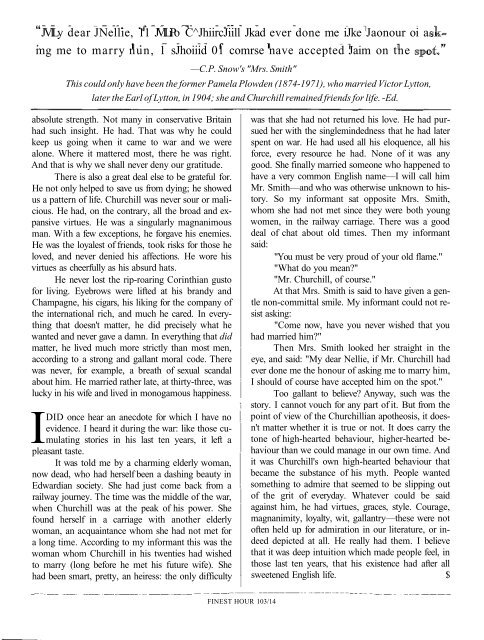.JOURNAL OFTIIE CHURCHILL CKNTER AND ... - Winston Churchill
.JOURNAL OFTIIE CHURCHILL CKNTER AND ... - Winston Churchill
.JOURNAL OFTIIE CHURCHILL CKNTER AND ... - Winston Churchill
- No tags were found...
You also want an ePaper? Increase the reach of your titles
YUMPU automatically turns print PDFs into web optimized ePapers that Google loves.
JVlLy dear JNellie, 11 JVILiPo C^JhiircJiill Jkad ever done me iJke Jaonour oi amg me to marry nun, 1 sJhoiiid 01 comrse nave accepted Jaim on tne—C.P. Snow's "Mrs. Smith"This could only have been the former Pamela Plowden (1874-1971), who married Victor Lytton,later the Earl of Lytton, in 1904; she and <strong>Churchill</strong> remained friends for life. -Ed.absolute strength. Not many in conservative Britainhad such insight. He had. That was why he couldkeep us going when it came to war and we werealone. Where it mattered most, there he was right.And that is why we shall never deny our gratitude.There is also a great deal else to be grateful for.He not only helped to save us from dying; he showedus a pattern of life. <strong>Churchill</strong> was never sour or malicious.He had, on the contrary, all the broad and expansivevirtues. He was a singularly magnanimousman. With a few exceptions, he forgave his enemies.He was the loyalest of friends, took risks for those heloved, and never denied his affections. He wore hisvirtues as cheerfully as his absurd hats.He never lost the rip-roaring Corinthian gustofor living. Eyebrows were lifted at his brandy andChampagne, his cigars, his liking for the company ofthe international rich, and much he cared. In everythingthat doesn't matter, he did precisely what hewanted and never gave a damn. In everything that didmatter, he lived much more strictly than most men,according to a strong and gallant moral code. Therewas never, for example, a breath of sexual scandalabout him. He married rather late, at thirty-three, waslucky in his wife and lived in monogamous happiness.IDID once hear an anecdote for which I have noevidence. I heard it during the war: like those cumulatingstories in his last ten years, it left apleasant taste.It was told me by a charming elderly woman,now dead, who had herself been a dashing beauty inEdwardian society. She had just come back from arailway journey. The time was the middle of the war,when <strong>Churchill</strong> was at the peak of his power. Shefound herself in a carriage with another elderlywoman, an acquaintance whom she had not met fora long time. According to my informant this was thewoman whom <strong>Churchill</strong> in his twenties had wishedto marry (long before he met his future wife). Shehad been smart, pretty, an heiress: the only difficultywas that she had not returned his love. He had pursuedher with the singlemindedness that he had laterspent on war. He had used all his eloquence, all hisforce, every resource he had. None of it was anygood. She finally married someone who happened tohave a very common English name—I will call himMr. Smith—and who was otherwise unknown to history.So my informant sat opposite Mrs. Smith,whom she had not met since they were both youngwomen, in the railway carriage. There was a gooddeal of chat about old times. Then my informantsaid:"You must be very proud of your old flame.""What do you mean?""Mr. <strong>Churchill</strong>, of course."At that Mrs. Smith is said to have given a gentlenon-committal smile. My informant could not resistasking:"Come now, have you never wished that youhad married him?"Then Mrs. Smith looked her straight in theeye, and said: "My dear Nellie, if Mr. <strong>Churchill</strong> hadever done me the honour of asking me to marry him,I should of course have accepted him on the spot."Too gallant to believe? Anyway, such was thestory. I cannot vouch for any part of it. But from thepoint of view of the <strong>Churchill</strong>ian apotheosis, it doesn'tmatter whether it is true or not. It does carry thetone of high-hearted behaviour, higher-hearted behaviourthan we could manage in our own time. Andit was <strong>Churchill</strong>'s own high-hearted behaviour thatbecame the substance of his myth. People wantedsomething to admire that seemed to be slipping outof the grit of everyday. Whatever could be saidagainst him, he had virtues, graces, style. Courage,magnanimity, loyalty, wit, gallantry—these were notoften held up for admiration in our literature, or indeeddepicted at all. He really had them. I believethat it was deep intuition which made people feel, inthose last ten years, that his existence had after allsweetened English life. $FINEST HOUR 103/14

















